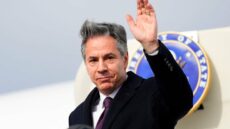The US has said it is “very concerned” China will soon supply Russia with lethal arms to help in its war against Ukraine after a fraught meeting between the two sides’ top diplomats on Saturday that addressed multiple Sino-American tensions.
The frank exchanges between US secretary of state Antony Blinken and China’s top foreign policy official Wang Yi were the first face-to-face interactions between top Washington and Beijing officials since the US shot down a suspected Chinese spy balloon that floated over North America earlier this month.
During the meeting on the sidelines of the Munich Security Conference, Blinken demanded China cease the use of spy balloons over the US while stressing that any material support from Beijing for Russia’s military would have “serious consequences” for US-China relations.
China’s foreign ministry issued a firm statement following the exchanges, stressing that Wang only met with Blinken at the request of the US.
Beijing said it would never accept US attempts to “dictate” the terms of its relations with Moscow. Wang also reiterated China’s position on the balloon incident, saying its shooting down violated international conventions.
He told the US to “change course” and fix the damage done to the bilateral relationship by its “abuse of force”.
Both sides’ accounts of the meeting suggested little sign of tensions easing two weeks after the incident prompted Blinken to abruptly cancel a planned trip to China.
In a development that could further test diplomatic relations, Blinken told US television network NBC that Washington was becoming increasingly concerned that China’s political support for Russia could soon escalate to providing weapons and ammunition for its war in Ukraine.
Blinken told NBC: “Some further information that we are sharing today and that I think will be out there soon . . . indicates that they are strongly considering providing lethal assistance to Russia.
“I made clear [to Wang] that would have serious consequences in our relationship as well, something that President [Joe] Biden has shared directly with President Xi [Jinping] on several occasions,” he said.
Blinken said he was also “direct” with Wang in his warnings about China’s high-altitude surveillance balloon programme, which the US believes has intruded into the airspace of more than 40 countries over five continents.
“I made very clear to him that China’s sending a surveillance balloon over the United States in violation of our sovereignty, in violation of international law, was unacceptable and must never happen again,” Blinken told CBS. “It is safe to say there was no apology.”
The US suspects the balloon, which spent a week flying over the US and Canada, was used for surveillance — something that Beijing has denied.
Western officials now believe the balloon may have drifted off its intended course, which was not set for the US mainland.
Biden said earlier this week he aimed to speak with Xi to “get to the bottom” of the incident, without specifying when.
China’s state media has been seeking to highlight Washington’s record on espionage, with the state-run People’s Daily carrying a story headlined: “The US is world’s biggest spying power”.
Beijing repeated allegations on Sunday that the US had repeatedly flown balloons over China, accusations Washington has vehemently denied.
Blinken told Wang that the US was “not looking for a new cold war”, a state department spokesman said after the meeting.
Earlier in the day, Wang used a speech at the Munich conference — attended by top officials from across the world — to criticise Washington for what he said was the “hysterical and absurd” US decision to shoot down the balloon.
“Across the globe, there are many balloons from many countries. Do you want to shoot down every one of them?” he said. “It did not show that the US is strong. On contrary, it showed the opposite. We urge the US not to do such preposterous things in order to divert attention from its domestic problems.”
The People’s Daily tweeted on Sunday that China would hold maritime exercises with Russia and South Africa off the east coast of the African nation starting on Monday, in the latest illustration of Beijing’s close ties with Moscow.
The announcement came after Wang spoke in Munich to defend China’s relationship with Russia, saying the US would never dictate ties between the two countries.
China’s state media also hailed a meeting between Wang and EU foreign policy head Josep Borrell in Munich at the weekend, saying the Chinese official told his counterpart the two sides were not “rivals but partners”.
The meeting follows a charm offensive by Beijing this year as it seeks to mend ties with its main economic partners following the end of its zero-Covid policy, which hurt growth and threatened to cut China off from the rest of the world.
Additional reporting by Thomas Hale in Shanghai
